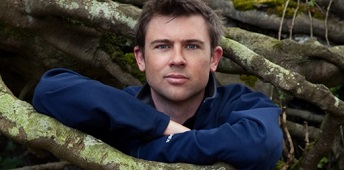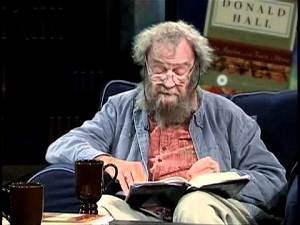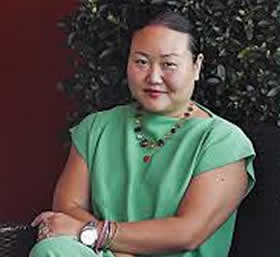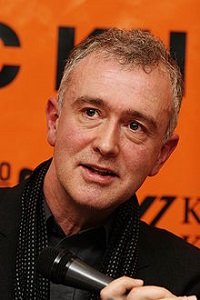De Engelse (Welshe) dichter, schrijver en presentator Owen Sheers werd geboren op 20 september 1974 in Suva op de Fiji eilanden en groeide op in Abergavenny, Zuid-Wales. Hij bezocht de King Henry VIII School in Abergavenny, voordat hij ging studeren aan New College, Oxford en de Universiteit van East Anglia, waar hij een MA in creatief schrijven behaalde. Tijdens zijn studietijd aan het New College leidde Sheers het moderne pentatlonteam van de Universiteit van Oxford. In 1999 ontving Sheers een Eric Gregory Award van de Society of Authors. Zijn eerste bundel poëzie, “The Blue Book”, werd in 2000 uitgegeven. De bundel haalde de shortlist voor het Wales Book of the Year en de Forward Prize voor ‘Best First Collection’. Na deze eerste publicatie werkte Sheers aan het lichte entertainment-tv-programma The Big Breakfast mee als onderzoeker. Zijn prozadebuut “The Dust Diaries” werd in 2004 uitgegeven. Het werd in 2005 het Wales Book of the Year en was ook genomineerd voor de Ondaatje-prijs van de Royal Society of Literature. Voor Sheers tweede poëziebundel “Skirrid Hill” uit 2005 ontving hij een Somerset Maugham Award. “Unicorns, een bijna eenmanspel, gebaseerd op het leven en de poëzie van de WOII-dichter Keith Douglas, werd ontwikkeld door Old Vic, New Voices en uitgevoerd door Joseph Fiennes. Sheers eerste roman “Resistance”, is vertaald in tien talen en stond op de shortlist voor de Writer’s Guild of Great Britain Best Book Award 2008 en won een 2008 Hospital Club Creative Award. Deze roman werd in 2011 verfilmd. In 2007 werkte Sheers samen met componist Rachel Portman aan “The Water Diviner’s Tale”, een oratorium voor kinderen dat in première ging in de Royal Albert Hall voor de BBC Proms. In 2007/8 was Sheers Dorothy en Lewis B. Cullman Fellow in de New York Public Library. Sheers werkte ook als journalist en schreef reportages voor verschillende tijdschriften, waaronder Granta, The Guardian, Esquire, GQ, The Times en The Financial Times. Ook schreef hij een toneelstuk voor BBC Radio 4 over de WOII-dichter Alun Lewis: “If I Should Go Away”. In 2012 schreef Sheers “The Two Worlds of Charlie F”, een toneelstuk gebaseerd op de ervaringen van gewonde soldaten, van wie velen ook de cast van de productie vormden, geregisseerd door Stephen Rayne en opgevoerd in de Theatre Royal Haymarket. Zijn versdrama “Pink Mist” werd voor het eerst uitgezonden op Radio 4. “Pink Mist” werd in 2014 Welsh Book of the Year en werd geproduceerd als toneelstuk door het Bristol Old Vic-theater in 2015.
Uit:Resistance
“For Sarah Lewis it began in her sleep. The drag, rattle, and bark of the dogs straining on their chains was so persistent it entered her dreams. A ship in storm, the sailors shouting for help from the deck, their pink faces and open mouths obscured by the spray blown up the sides of the hull. Then the noise became Marley’s ghost, dragging his shackles over a flagstone floor. Clink,slump, clink, slump. Eventually, as the light brightened about the edges of the blackout curtain and Sarah surfaced through the layers of her sleep, the sound became what it was. Two dogs, urgent and distressed, pulling again and again on their rusty chains and barking, short and sharp through the constraint of their collars.
Without opening her eyes Sarah slid her hand across the sheet behind her, feeling for the warm impression of her husband’s body. The old horsehair mattress they slept on could hold the shape of a man all day and although Tom was usually up before her, she found comfort in touching the warm indentation of where he’d lain beside her. She stroked her palm over the thin cotton sheet. A few hairs poking through the mattress caught against her skin, hard and stubborn as the bristles on a sow’s back.
And there he was. A long valley where his weight had pressed the ball of his shoulder and his upper arm into the bed; a rise where his neck had lain beneath the pillow. She explored further down. A deeper bowl again, sunk by a protruding hip and then the shallower depression of his legs tapering towards the foot of the bed. As usual, Tom’s shape, the landscape of him, was there. But it was cold. Normally Sarah could still feel the last traces of his body’s heat, held in the fabric of the sheet just as the mattress held his form. But this morning that residue was missing.
With fragments of her dreams still fading under her lids, she slid her hand around the curves and indentations again, and then beyond them, outside the borders of his body. But the sheet was cold there too. The dogs below her window barked and barked, their sound making pictures in her mind’s eye: their sharp noses tugging up with each short yap, exposing the white triangles of their necks, flashing on and off like a warning. She lay there listening to them, their chains rising and falling on the cobblestones of the yard.
Tom must have been up early. Very early. Not in the morning at all but in the night. She turned on her side and shifted herself across the bed. The blankets blinked with her movement and she felt a stab of cold air at her shoulder. Pulling them tight about her neck, she lay there within the impression of her husband, trying not to disturb the contours of his map.“

Owen Sheers (Suva, 20 september 1974)




